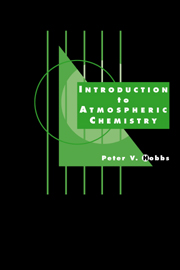Book contents
- Frontmatter
- Contents
- Preface
- 1 Evolution of the Earth's atmosphere
- 2 Half-life, residence time, and renewal time of chemicals in the atmosphere
- 3 Present chemical composition of the atmosphere
- 4 Interactions of solar and terrestrial radiation with atmospheric trace gases and aerosols
- 5 Sources, transformations, transport, and sinks of chemicals in the troposphere
- 6 Atmospheric aerosols
- 7 Cloud and precipitation chemistry
- 8 Tropospheric chemical cycles
- 9 Air pollution
- 10 Stratospheric chemistry
- Appendix I Exercises
- Appendix II Answers to exercises in Appendix I and hints and solutions to the more difficult exercises
- Appendix III Atomic weights
- Appendix IV The International System of Units (SI)
- Appendix V Some useful numerical values
- Appendix VI Suggestions for further reading
- Index
9 - Air pollution
Published online by Cambridge University Press: 05 June 2012
- Frontmatter
- Contents
- Preface
- 1 Evolution of the Earth's atmosphere
- 2 Half-life, residence time, and renewal time of chemicals in the atmosphere
- 3 Present chemical composition of the atmosphere
- 4 Interactions of solar and terrestrial radiation with atmospheric trace gases and aerosols
- 5 Sources, transformations, transport, and sinks of chemicals in the troposphere
- 6 Atmospheric aerosols
- 7 Cloud and precipitation chemistry
- 8 Tropospheric chemical cycles
- 9 Air pollution
- 10 Stratospheric chemistry
- Appendix I Exercises
- Appendix II Answers to exercises in Appendix I and hints and solutions to the more difficult exercises
- Appendix III Atomic weights
- Appendix IV The International System of Units (SI)
- Appendix V Some useful numerical values
- Appendix VI Suggestions for further reading
- Index
Summary
We have seen in Chapter 8 that, even on a global scale, anthropogenic emissions can cause significant perturbations to the budgets of certain trace chemical species in the atmosphere. In urban and industrialized areas, anthropogenic emissions can become so large that the concentrations of various undesirable chemical species (called pollutants) cause significant deterioration in air quality and visibility, and can pose threats to human health. Severe air pollution episodes occur when the rates of emissions or formation of pollutants greatly exceed the rates at which the pollutants are dispersed or destroyed by winds or by vertical transport (e.g., in the presence of a capping temperature inversion) or removed from the atmosphere (e.g., by precipitation or by chemical Reactions).
Sources of anthropogenic pollutants
Combustion (in power plants, smelters, automobiles, and of wood, etc.) is the largest source of air pollutants. On a global scale fossil-fuel combustion is the major source of CO, CO2,NOx, and SO2 (see Figs. 8.1–8.3). Many other pollutants are released into the air by combustion. For example, about 15% of the total emissions of hydrocarbons are from anthropogenic sources; this is because the most common fuels are hydrocarbon compounds (oil, natural gas, coal, and wood). Ideal (or complete) oxidation (or combustion) of hydrocarbon fuel yields only CO2 and H2O. However, for a given quantity of fuel, a precise amount of oxygen is required for complete combustion.
- Type
- Chapter
- Information
- Introduction to Atmospheric Chemistry , pp. 153 - 163Publisher: Cambridge University PressPrint publication year: 2000



